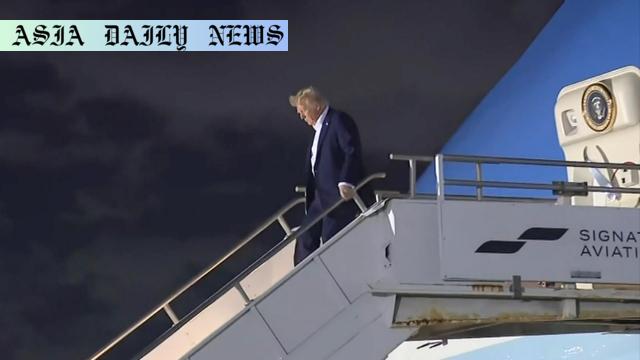Israel Bomb Deliveries – President Trump has lifted a hold previously imposed by Joe Biden on the delivery of 1,800 MK-84 bombs.
Trump lifts Biden’s hold on delivering 1,800 MK-84 bombs to Israel amid escalating tensions in Gaza.
Reports suggest Biden blocked delivery over concerns for civilian safety in Gaza.
Trump calls for Jordan and Egypt to house civilians from Gaza, offering ideas for long-term resettlement projects.

Trump Resumes Bomb Deliveries to Israel After Biden’s Hold
In a significant move, US President Donald Trump has reopened the delivery of large munitions to Israel, reversing a policy implemented by his predecessor, Joe Biden. Trump announced the decision on Saturday during a Q&A session on Air Force One, signaling a shift in the US administration’s stance on the Gaza conflict and its approach toward the Middle Eastern ally.
Biden’s Initial Hold on Deliveries
In May of the previous year, President Biden had put the shipment of 1,800 MK-84 bombs on hold. This decision was primarily based on concerns over the potential use of these large-scale munitions in civilian-populated areas in Gaza, where the risk of escalating civilian casualties was high. The move was largely supported by international humanitarian organizations that have been closely monitoring ongoing conflicts in the Gaza region.
Trump’s Announcement and Strategic Shift
President Trump, addressing reporters, stated that items “paid for by Israel” are now being delivered. This delivery consists of the aforementioned MK-84 bombs, a critical addition to Israel’s military arsenal. These munitions, which had been stored in the US, are set to arrive in Israel in the coming days. The president’s social media post further solidified the announcement, framing the decision as a commitment to strengthening US-Israeli ties and providing requested military support.
New Policies on Gaza
In addition to the armament decision, Trump addressed his vision for addressing the ongoing crisis in Gaza. Calling the region “a real mess” and a “demolition site,” he suggested that the displaced population of Gaza could find temporary or even permanent homes in neighboring Arab nations. To this end, he mentioned reaching out to King Abdullah of Jordan and planning further discussions with Egyptian President Abdel Fattah el-Sisi. Trump’s remarks suggest a heavier reliance on regional actors to manage the humanitarian aspects of the conflict while the US focuses on its strategic and military allegiances.
Arms Shipment and Regional Reactions
The resumption of these bomb deliveries is likely to invoke varied responses internationally. While Israel views the development favorably—especially in its ongoing defense initiatives—other Middle Eastern nations are likely to express concerns. Human rights organizations have already condemned the use of heavy munitions in densely populated areas like Gaza, where civilian safety risks remain alarmingly high. Trump’s push for Arab nations to house displaced Gazans may also face logistical and political challenges, given the strained capacities of these host countries.
Strategic Capabilities and US-Israeli Relations
This development underscores the enduring military and diplomatic partnership between the US and Israel. The decision to release weapons that were previously withheld portrays a clear signal of support for Israeli policies. Trump’s direct involvement in shaping the humanitarian discourse also indicates his intent to remain actively engaged in Middle Eastern geopolitics.
Despite the polarizing nature of this decision, Trump’s actions may consolidate his base of conservative and pro-Israel supporters. However, the greater implications of this decision on international peace efforts remain to be seen.
Commentary
Analyzing Trump’s Decision on Bomb Delivery
President Trump’s choice to resume the delivery of 1,800 MK-84 bombs to Israel is bound to create ripples both in Washington and globally. This decision highlights the contrasting foreign policies between Trump and his predecessor Joe Biden. At its core, it reflects Trump’s unwavering support for Israel, and his administration’s prioritization of Israeli defense over humanitarian concerns.
Balancing Civilian Safety and Military Support
While the Trump administration emphasizes national security and bilateral allegiance with Israel, critics argue that such moves could escalate civilian casualties in Gaza, further complicating an already dire humanitarian crisis. Biden’s initial hold on these munitions was grounded in safeguarding civilian lives, a sentiment shared by many international bodies. Reversing this decision runs the risk of jeopardizing the US’s broader global image as a mediator in conflict zones.
Trump’s Broader Middle Eastern Strategy
The president’s remarks about relocating Gaza’s residents to neighboring regions like Jordan and Egypt introduce a contentious topic with long-term implications. While Trump’s vision might aim to relieve pressure in Gaza, it raises questions about the feasibility and ethical implications of resettlement, and whether such actions would be perceived as displacement rather than assistance.
Conclusion
Trump’s decision sets the stage for ongoing debates surrounding US-Israeli relations and the administration’s role in Middle Eastern conflicts. It reflects the intricate balance between military support for Israel and addressing humanitarian challenges in the region. As the bombs are dispatched and diplomatic efforts continue, the unfolding outcomes will be a test of the US’s global influence and ability to navigate contentious geopolitical landscapes.


